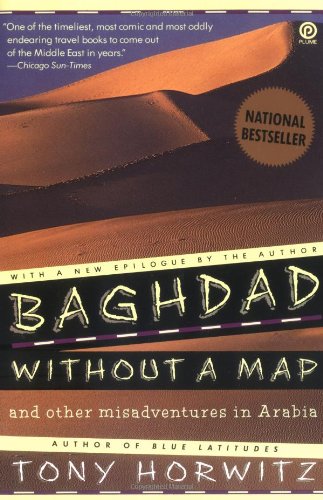His journey begins when his wife gets a correspondent’s post in Cairo, and he follows as a stringer – a reporter who gets irregular jobs while living abroad. We get more insights into the tough life of a freelancer when he heads off to Yemen in search of a story “on spec,” a quasi-assignment with no guarantees of publication. The hilarity starts when he’s invited to join in the national pastime, chewing qat, a leafy green stimulant.
Having learned that such gatherings are BYOQ affairs, he picks up a bush of his own at a market. “Several thousand men in extreme good humor wandered from one pickup to another, each vehicle loaded with what looked like piles of yard clippings. Farther back sprawled a covered bazaar, also devoted to qat, and behind that, a tired-looking vegetable and animal market, dwarfed by the commerce in shrubs."
After stocking up on “Yemen salad,” he takes a taxi to the party. “I have chewed every day since the age of fifteen and I am still not an addict,” his cabbie tells him confidently.
He joins the party with the boys, replete with Pepsi, water pipe, and brass spittoons. “I was so busy chewing and hacking and spitting that I didn’t notice at first that the carpet was massaging my toes…. I stopped chewing for a moment, feeling a sudden urge to leap to my feet and stretch. But someone had glued my back to the cushions…. The tingling in my toes worked its way up my calves and along the back of my thighs and flooded into my spine."
“‘I can see from the stupid smile on your face that you have discovered the wonders of qat,’” says his host.
Horwitz describes with equal verve the obsession of Cairo men with rotund belly dancers, as well as finding humor and warmth in the most harrowing of situations.
Before long, Horwitz travels to the Persian Gulf during the Iran-Iraq War, hunting for a story on the disruption of shipping. After encountering spoiled students at a weekend camel races and obnoxious, sex-starved Texas oilmen who’ve lived there for decades, he finally catches a dhow to explore the waters. The boat is run by Indians, part of the “subcontinental drift that brought millions of Indian workers to the oil-rich Arabian shores.” Most of the people who went down with all the merchant ships sunk in the war, Horwitz points out, were “Indian, Pakistani, Korean or Filipino.”
Sailing out at night onto the inkwell of the Persian Gulf, he discusses sex and religion with his companions: Is it true that men and women in America live together without marriage? How is it then that they are still virgins when they marry? I have always wanted to meet this thing called Jew, and to hear about your messiahs. Horwitz admits to his own naiveté in asking of the Hindus, “What happens after the pyre?” Modern people don’t believe in reincarnation, the skipper replies.
During the day, what he sees on the Gulf is “an orange sea snake slithering past our bow and a dolphin poking its head above water. The rugged pink cliffs of Oman rose on one shore, the softer Iranian hills were shrouded in haze on the other. And in the thirty miles between lay an untroubled stretch of aquamarine.”
So much for that story, sacked by his editor for its lack of sensationalism, depth be damned.
Horwitz eventually manages to find his adrenaline rush as shells explode in the water around his boat from Cyprus to Lebanon during the latter’s civil war. He also experiences the ghastliness of the Iran-Iraq front, the ever-present fear of society under Saddam Hussein, the patronizing treatment of journalists in Gadhafi’s Libya, and nearly being trampled by seas of black-clad mourners at Ayatollah Khomeini’s funeral.
In the midst of these stories, Horwitz relates daily life in the Middle East with sensitivity. He captures poignantly the frustrations of a Cairo desk clerk he befriends, an intelligent young man who studies languages in his spare time, dreaming of marrying a foreign woman and emigrating. This Yousri personifies the thwarted desires and hopes of millions. Given the failures of the Arab Spring, his plight is most pertinent even a quarter-century later.
Baghdad Without a Map and Other Misadventures in Arabia, by Tony Horwitz.

 RSS Feed
RSS Feed